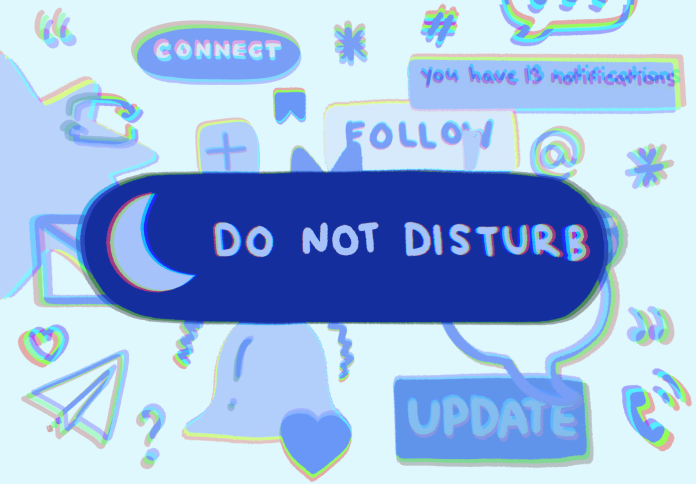Alexa Tan
Senior Staff Writer
Most students check their phones nonstop. It’s almost a defense mechanism: in most public places, people look down every few seconds to check for new messages and updates or even take their BeReals. And while it can be fun to feel connected to friends and family despite hectic schedules, phones can feel more like a distraction than an assistant.
“I’ve been staring at screens all day,” you might say.
This is the reality for most students, stuck between lectures, professional development, and extracurricular activities while trying to maintain relationships in a highly digital world. Phones feel like a necessity, with countless apps and reminders needed just to be able to participate in school, work, or spend time with friends. Being pulled in multiple directions this way, it’s no wonder phones can feel both like comfort and a vice, chaining us to productivity 24/7.
That’s where the “Do Not Disturb” button comes in.
For iPhones and many other smartphones, you can easily turn off distractions and let your contacts know with a simple swipe down. Your status can be easily shared with friends and family to let them know you’ve “disconnected” for some time to focus your attention on other things, whether that be an essay, a committee meeting, or rest.
That simple button allows you to feel some control against information overload, plugging the incessant flow of information — at least for a little bit. You can halt all the dings, buzzes, and banners that steal your attention away. By turning it on, you’re telling people that you’re focusing on something more important.
With the ability to let others know that you’re “focused,” it seems cooler to appear too busy to be bothered with insignificant notifications. Self-importance is not in short supply, especially in a school with students full of ambition. With everyone having a phone, that means everyone has a platform, a status, and a following. We’ve quantified almost every aspect of our existence. Notifications and how much you’re bombarded with them are just another measure of that.
After all, there’s always something vying for our attention, often for profit.
Clickbait headlines, endless advertisements, and marketing ploys everywhere can make staying connected — via our phones — a chore. And with nothing but turmoil, inequality, and violence being reported on, it’s no wonder so many of us feel a sense of dread.
Our phone’s notifications can be overwhelming, and while they’ve come a long way in making our lives better, the problems they bring are concerning. After all, our devices can be vices of distraction by finding an “out” from doing tedious work simply by looking over at our screens. With no separation from work and rest, phones keep us plugged in, often to our detriment.
Do Not Disturb may feel like a one-stop defense against this, but the dread of not knowing can be consuming. The radio silence may feel like a comfort, but once we sit down to do work, our minds might wander to what might be happening. The selfies, tweets, emails, posts, reminders — all the things that take our attention away still occupy a space in our minds even when they aren’t there.
There’s a byproduct of that anxiety: phantom vibrations, the false sensation that your phone is vibrating. It’s evidence that phones fundamentally change how we’re wired — and not for the better. That bad habit of always reaching in your pocket to glance at a notification might not just be an attention issue. It could very well be a sign of obsession.
Do Not Disturb feels like a bandaid for a much bigger problem, a fundamental one that got us to the point where we need our phones to stop doing what they’re designed to do: connect people. Is that connection a burden or just a mild annoyance? That’s up to you, the user.
Attention isn’t infinite, and the space in our minds remaining after all the other things life throws at us is precious. It’s where doom-scrolling can easily kick in, with companies making millions off of your search for distraction. When we value the time we spend disconnected, taking a break from screens may actually feel like a break.
But, most of us can’t be bothered to.











